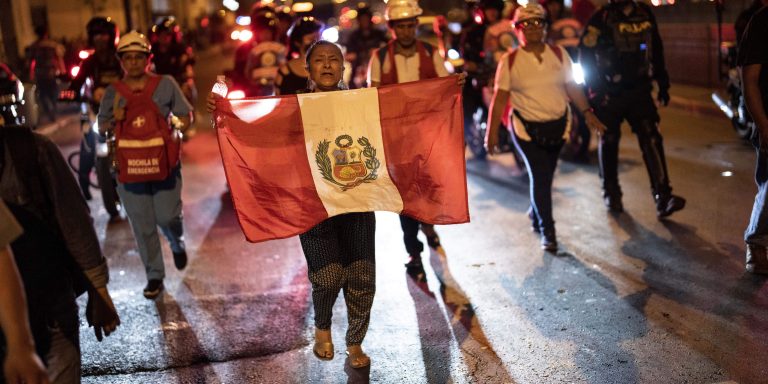INTELBRIEF
February 17, 2023
IntelBrief: Peru’s Political Crisis Deepens as Congress Fails to Set New Elections

Bottom Line Up Front
- Months of violent unrest reflecting widespread discontent over governance has deepened Peru’s political and civil crisis.
- Demonstrators have disrupted industries vital to the country’s economy, worsening record-high inflation in the country.
- Economic disruptions caused by the demonstrations, coupled with inflation and widespread food insecurity, is likely to fuel grievances and exacerbate the crisis.
- A solution to the crisis remains elusive, as Peru’s president and congress have not provided concessions to curtail the anger of protestors.
Violent protests, now in their third month, have deepened the political and civil crisis in Peru, and reflect widespread discontent over inequities and the political establishment. The crisis reached a tipping point in December when former president Pedro Castillo was impeached and arrested after he sought to dissolve the country’s Congress – a move many characterized as an attempted coup. Over the past two months, anti-government protests that began in support of Castillo have given way to demands for the resignation of President Dina Boluarte, who was the vice president under Castillo and took over the country after his removal. Protestors have also demanded the dissolution of Congress and that new elections be held this year. Clashes between protestors and security forces have left at least 60 dead, the vast majority of whom were protestors, over 1,200 injured during protests, and 580 police officers wounded. The UN’s human rights office has called for an investigation amid accusations by Amnesty International that the country’s security services have engaged in unlawful lethal violence. Beginning in rural areas and mining regions, the protests have spilled into the capital, Lima. Without offering evidence, the Peruvian government has sought to cast the demonstrators as terrorists and vandals, claiming they are supported by drug traffickers, illegal mining mafias, and Bolivian leftists – a characterization rejected by protestors.
Discontent over the government is widespread, with polls by the Instituto de Estudios Peruanos showing that 76 percent of people in Peru disapprove of Boluarte and 89 percent disapprove of the country’s congress. Even before the crisis, the people of Peru were one of the most dissatisfied with democracy in all of Latin America and the Caribbean, second only to Haiti, at 21%, according to Vanderbilt University’s LAPOP Lab. Peru is not the only South American country facing democratic crises: Brazil saw its capitol stormed by supporters of its former right-wing president last month, while Haiti has been without a single active member of parliament since January amid intense national gang violence.
The political turmoil is fueled by longstanding grievances about social inequality, discrimination, and government elitism, widely held sentiments that proved a strong foundation for the former president’s electoral support. Many rural and indigenous Peruvians related to Castillo’s rural background, while his campaign pledges to give a voice to the forgotten rural communities and redistribute mineral wealth resonated with many Peruvians who feel politically and economically disenfranchised. Despite accusations of poor governance and corruption, as well as his attempt to dissolve congress, Castillo still retains strong support in poorer rural areas.
Demonstrators have blocked highways, attacked mining infrastructure, and invaded airports, disrupting industries vital to the country’s economy. Peru’s National Chamber of Tourism estimates that the tourism sector, still recovering from the impacts of the COVID-19 pandemic, has lost $400 million since the protests began in December. Machu Picchu, the UNESCO World Heritage site that attracts thousands of tourists a day, was temporarily closed in December as protestors blocked key access routes and transport lines, dealing a significant blow to the tourism industry and local economy. Road closures, blockades, and attacks by protestors have forced several mines to temporarily suspend or reduce operations, putting a third of Peru’s copper output – about 11 percent of the world’s mined total – at risk. Peru has also lost an estimated $300 million in agricultural exports in the first two months of the protests. Closures have also led to supply chain issues and shortages in petrol, cooking gas, and food, driving up the price of goods already subject to record inflation. Such economic realities will disproportionately impact Peru’s most vulnerable, particularly those in rural and indigenous communities, at a time when more than half the country’s population lacks regular access to safe and nutritious food and 25 percent of the population sits below the poverty line, according to the UN’s Food and Agriculture Organization.
A solution to the crisis remains elusive, as Peru’s congress voted last week against moving up general elections to December 2023 – a key demand of demonstrators – despite Boluarte’s urging to do so. Consensus on the issue appears distant, with Castillo’s leftwing party refusing to support changes that do not create an opportunity to drafting a new constitution. The country’s current constitution was put in place during the authoritarian Fujimori government of the 1990s. The political paralysis has reinforced frustrations over politicians and the democratic system, with many accusing elected officials of only wanting to retain power rather than work toward an end to the crisis.
The ongoing instability and lack of a sustainable solution poorly positions the country to address the root causes of the crisis and will make tackling other national security issues of even more difficult. Over the weekend, seven police officers were killed in an area where drug traffickers operate in alliance with remnants of the insurgent group Sendero Luminoso (Shining Path) in what Peru’s interior ministry said was the deadliest attack on police in more than a decade. In response, Boluarte vowed to crackdown on “narcoterrorism” and drug-trafficking in the region at the center of the ongoing security force operations against remnants of Sendero Luminoso. Such a crackdown may prove difficult as security forces are deployed to ongoing demonstrations and a country gripped with political instability.